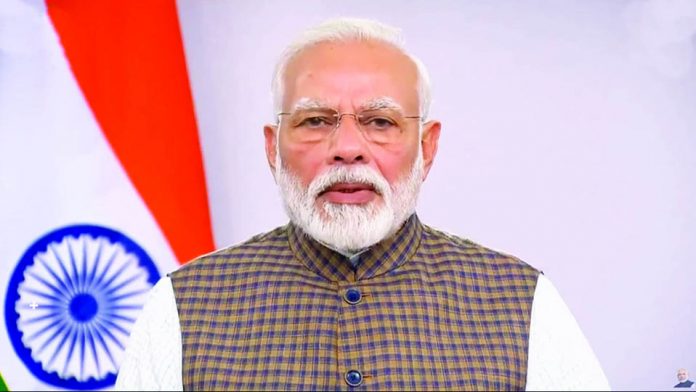Prime Minister Narendra Modi on Saturday stressed on the use of local language in the delivery of justice to the citizens, stating that writing laws in a simple language, preferably in a regional language, would bring in the ease of justice.
He expressed these views, while addressing the inaugural session of the two-day ‘All India Conference of Law Ministers and Law Secretaries’ at Ekta Nagar in Kevadia near the ‘Statue of Unity’ in Gujarat through a video message.
Organised by the Union Ministry of Law and Justice, the two-day conference aimed at providing a common forum for policymakers to discuss issues relating to the Indian legal and judicial system.
Urging the Law Ministers and Secretaries to make new laws in a language that could be easily understood by the common man, especially the poor, the Prime Minister stressed on abolishing the laws, which have been going on since the time of independence.
He said making the judicial system sensitive to the needs of common man was important for a capable nation and a harmonious society.
The Prime Minister observed that if there was confusion in the law itself, it was the common citizens who had to bear the brunt in the future, no matter the intentions.
Calling the delay in getting justice as one of the major challenges faced by the people of the country, the Prime Minister said the judiciary in the country was working seriously on this.
As per the Prime Minister, the government had paid special attention to ease the burden of people by scrapping obsolete laws.
He said in the past eight years, his government had scrapped more than 1,500 old, obsolete and irrelevant laws, many of which continued from the time of British rule.
The Prime Minister said the speciality of Indian society was that for thousands of years, while walking on the path of development, it also carried out internal reforms.
The society voluntarily got rid of obsolete laws, bad customs and traditions because as they became stereotypes, they posed a hindrance to progress, he added.
Advocating for creation of a legal academic system in mother tongue for the youth, the Prime Minister said law courses should be made available in mother tongue, while digital libraries of important cases of High Courts and the Supreme Court should be made available in local language.
This will help in increasing the knowledge of law among the common people and reduce the fear of heavy legal terminologies, he added.
As per Modi, legal language should not become a hurdle in the delivery of justice to citizens, but should rather ease the process.
He said making the judicial system sensitive to the needs of the common man was important for a capable nation and a harmonious society.
Calling the delay in getting justice as one of the major challenges faced by the people of the country, the Prime Minister said the judiciary in the country was working seriously on this.


